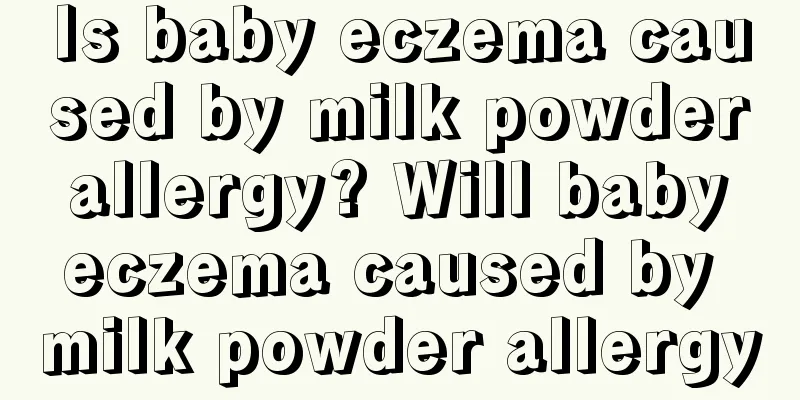Is baby eczema caused by milk powder allergy? Will baby eczema caused by milk powder allergy

|
Babies are very fragile in all aspects because they are just born. Babies often suffer from eczema. Many mothers think that babies have eczema because of allergies. So let's find out whether baby eczema is caused by milk powder allergy. Will babies develop eczema if they are allergic to milk powder? Is baby eczema caused by milk powder allergy?Infant eczema is a common skin disease in infants. There are many causes of infant eczema, such as genetic factors, protein allergy, etc. In addition, environmental factors and improper care can also cause infant eczema. If diagnosed with protein allergy, the baby's eczema symptoms are likely caused by milk powder. If the baby is allergic to milk powder, it is best to choose breastfeeding. At the same time, the mother should pay attention to a light diet and avoid allergic foods such as eggs, milk, and seafood. After the onset of infant eczema, the skin should be kept clean, pure cotton clothes should be chosen, and the baby's nails should be trimmed in time to prevent scratching and infection. Will baby develop eczema if he is allergic to milk powder?Yes. Infant milk powder allergy means that after the baby drinks formula milk powder, some allergic reactions occur. Usually the allergen is milk protein, and the symptoms are manifested on the skin. Some proteins in milk, such as α-s1 casein and β-lactoglobulin, are currently recognized allergens. Under normal circumstances, if these two proteins can be digested and absorbed by the human body, they will not cause allergic reactions in the human body. However, in the first few months after the birth of the baby, if the body's digestive ability is insufficient and the enzyme system for digesting protein is immature, the protein entering the body is not fully decomposed and absorbed into the blood; plus the baby lacks the protective antibody distributed on the surface of the intestinal mucosa-secretory immunoglobulin A. The lack of such antibodies can cause intestinal bacteria to cause inflammation on the mucosal surface, thus accelerating the absorption of foreign proteins by the intestinal mucosa and inducing gastrointestinal allergic reactions. Allergic reactions can be divided into two types: immediate and delayed food allergic reactions. The immediate type usually occurs within 2 hours after eating food containing allergens, and the symptoms are generally severe. The delayed type usually occurs several hours or days after eating, and the symptoms are relatively mild. In addition to diarrhea, abdominal pain, skin itching, urticaria, and eczema, people who are allergic to milk protein may also suffer from serious life-threatening symptoms such as difficulty breathing and low blood pressure. Can babies with eczema be exposed to the sun?Babies with eczema cannot be exposed to the sun, because after the baby develops eczema, it may cause congestion in the affected area, such as erythema or inflammatory papules. In severe cases, it may be accompanied by inflammatory exudation, scabs or peeling. In this case, sunbathing may cause local temperature rise and congestion due to the stimulation of ultraviolet and infrared rays from the sun. Congestion is not conducive to the recovery of eczema, so try to avoid sunbathing in this case. After the baby eczema appears, it is necessary to actively take drug treatment, such as applying hydrocortisone butyrate cream or budesonide cream. Pay attention to local cleaning and moisturizing in care, and try not to use bath products. There are several types of baby eczemaThe types of infant eczema are actually similar to those of adult eczema, and are basically divided into three types: acute eczema, subacute eczema, and chronic eczema. Acute eczema is mainly caused by certain irritation reactions in children, or an acute inflammatory exudative reaction of the skin caused by acute allergies. It is generally manifested as some inflammatory erythema on the skin of children, as well as papules and papulovesicles on the basis of erythema. Sometimes it may cause certain blisters, and produce obvious erosion and exudation. If subacute eczema occurs, it may gradually become dry, but at the same time, new papules and papulovesicles will also appear, and generally obvious scabs will appear. Of course, these scabs may be inflammatory scabs caused by the previous exudative reaction. Chronic eczema may also form, and obvious hypertrophy and dryness may appear at this time, and certain desquamation reactions may occur. |
<<: Is infant eczema caused by fetal toxins? How does infant eczema form?
Recommend
How to remove scars from caesarean section? How to remove scars from caesarean section
Generally, women who have undergone caesarean sec...
Can artificial insemination create twins? How many times can artificial insemination be performed?
Artificial insemination is the artificial control...
How to relieve severe morning sickness? Tips to improve morning sickness
Morning sickness is a symptom that all pregnant w...
Can Friso milk powder for pregnant women be taken dry? Can Friso milk powder for pregnant women be taken on an empty stomach?
In order to supplement the nutrients needed by th...
What are the main causes of dystocia? How to promote uterine recovery?
Many pregnant mothers tend to overthink what if t...
Can newborns use humidifiers? What are the hazards of baby air humidifiers?
Humidifier is a household appliance commonly used...
Is cesarean section really painless? 20 postpartum mothers tell you how painful cesarean section is
Many new mothers choose cesarean section to avoid...
How to teach your baby to crawl
It is essential for babies to learn to crawl duri...
How long does it take to deliver? What should I prepare for delivery?
Mothers whose due date is approaching can prepare...
What should the dressing table not face?
Every girl wants a dressing table of her own, but...
How long should a newborn baby with jaundice be exposed to the sun? Should a newborn baby with jaundice drink more water?
It is a common phenomenon for newborns to suffer ...
What should pregnant women eat to increase milk production? What should pregnant women eat to increase milk production quickly?
Many mothers start to worry about their breast mi...
Can roasted oranges cure children's coughs? Some points to note when roasting oranges to cure coughs
Injections and taking medicines are nightmares fo...
How can women quickly test for pregnancy? How long does it take to detect pregnancy?
For prospective parents who want to have a child,...
Which parts of the baby are prone to dislocation? Five major parts are prone to dislocation
The baby's body is very soft, and many parent...









